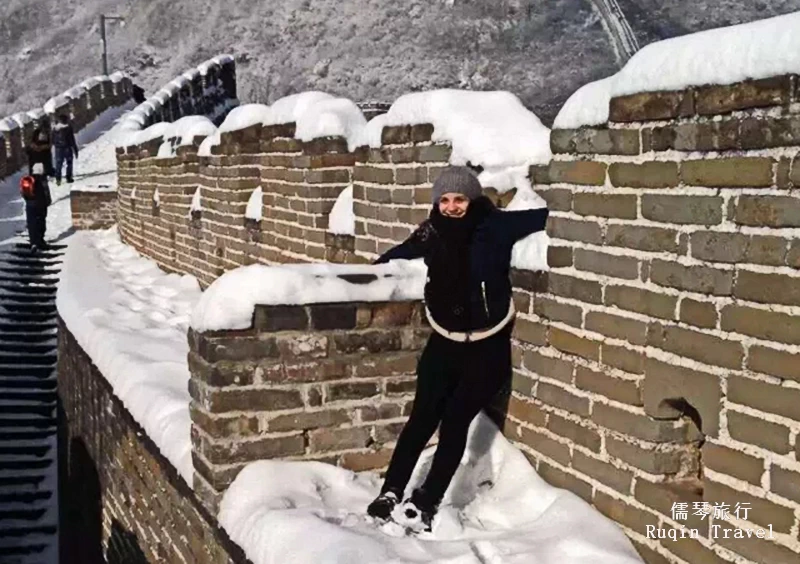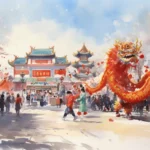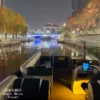Beijing in January is an experience like no other, offering a perfect blend of winter serenity and the bustling energy of China’s capital. The city takes on a crisp charm, with historical landmarks standing tall against clear, blue skies—especially if you’re lucky enough to catch a snow-covered day. The delicate white blanket that occasionally coats the Forbidden City, the Great Wall, and other ancient sites adds an extra layer of magic to the city’s rich history.
January is a unique time to explore Beijing. Whether you’re wandering through centuries-old temples, marveling at the imperial architecture, or enjoying the local winter festivals, the city has an undeniable charm. The winter months bring both tranquility and a festive atmosphere, from cozy tea houses to outdoor ice-skating rinks.
This guide is designed for first-time visitors to Beijing during January. It offers essential tips on how to fully embrace the season, from navigating the chilly weather to discovering local events and activities that make this time of year special. Ready for a winter adventure in Beijing? Let’s dive in!
1. January Weather in Beijing
Beijing in January is a winter wonderland of crisp, cold air and bright sunny days. Temperatures average around -4.7°C, with chilly winds from the north or northwest making it feel even colder. These winds, however, often clear the skies, leaving stunning views of the city’s landmarks.
Indoors, you’ll be pleasantly surprised by Beijing’s highly effective heating system. Hotels, restaurants, and public spaces stay toasty warm, offering a cozy escape from the frosty outdoors. Whether you’re braving the elements or enjoying a cup of hot tea indoors, January in Beijing has its own charm.
2. What to Wear and Pack in Beijing in January
Packing for Beijing in January means preparing for the cold while staying comfortable. Bring heavy winter essentials like a down jacket, gloves, a warm hat, and sturdy boots for outdoor adventures. Indoors, thanks to Beijing’s excellent heating, lighter layers such as sweaters or long-sleeved shirts will keep you cozy.
Don’t want to lug bulky winter gear? No problem! Beijing’s shopping scene has you covered. Explore luxury malls or vibrant spots like Silk Street Market, where you’ll find a variety of winter clothes. Plus, shopping here is more than practical—it’s a chance to dive into the city’s lively culture.
3. Historical Climate Data and Tips for January in Beijing
Looking at Beijing’s historical climate data for January makes trip planning easier. Over the past 50 years, records show consistently cold and dry conditions. Temperatures often drop sharply, so packing warm winter gear is essential. Think thick coats, scarves, and insulated gloves.
| Date | Average High (°C) | Average Low (°C) | Extreme High (°C) | Extreme Low (°C) |
|---|---|---|---|---|
| Jan 01 | 2 | -8 | 13 (1976) | -17 (1966) |
| Jan 02 | 2 | -8 | 10 (1976) | -16 (1977) |
| Jan 03 | 1 | -8 | 9 (1963) | -15 (1969) |
| Jan 04 | 1 | -9 | 14 (2002) | -17 (1971) |
| Jan 05 | 1 | -9 | 10 (1995) | -17 (1970) |
| Jan 06 | 2 | -9 | 11 (1995) | -16 (1955) |
| Jan 07 | 1 | -8 | 10 (1995) | -15 (1955) |
| Jan 08 | 2 | -9 | 10 (1995) | -17 (1968) |
| Jan 09 | 1 | -9 | 9 (1984) | -18 (1951) |
| Jan 10 | 2 | -9 | 12 (2002) | -20 (1951) |
| Jan 11 | 1 | -9 | 10 (2002) | -20 (1951) |
| Jan 12 | 1 | -9 | 13 (1975) | -20 (1951) |
| Jan 13 | 1 | -9 | 8 (2003) | -23 (1951) |
| Jan 14 | 1 | -9 | 7 (1986) | -21 (1951) |
| Jan 15 | 1 | -10 | 11 (1971) | -19 (1951) |
| Jan 16 | 1 | -10 | 11 (1986) | -18 (1967) |
| Jan 17 | 1 | -9 | 9 (2007) | -19 (1953) |
| Jan 18 | 1 | -9 | 10 (1969) | -17 (1958) |
| Jan 19 | 2 | -9 | 9 (1952) | -16 (1977) |
| Jan 20 | 2 | -8 | 9 (1961) | -16 (1966) |
| Jan 21 | 2 | -9 | 10 (1955) | -15 (1951) |
| Jan 22 | 2 | -8 | 10 (1959) | -16 (1951) |
| Jan 23 | 2 | -9 | 11 (1979) | -14 (1976) |
| Jan 24 | 2 | -8 | 11 (1979) | -17 (1960) |
| Jan 25 | 2 | -9 | 12 (1979) | -16 (1966) |
| Jan 26 | 3 | -8 | 11 (1992) | -15 (1976) |
| Jan 27 | 2 | -8 | 10 (1952) | -18 (1972) |
| Jan 28 | 2 | -8 | 11 (1987) | -16 (1960) |
| Jan 29 | 2 | -8 | 10 (1983 |
This data also offers valuable insights for planning your activities. Knowing what to expect in terms of temperature and minimal precipitation helps you schedule outdoor adventures with confidence. Be ready for crisp, chilly days and make the most of Beijing’s winter charm.
4. Ice Festivals in January, Beijing
Starting in mid-January, Beijing transforms into a winter wonderland with spectacular ice festivals. One of the most popular events is the Longqing Gorge Ice Lantern Festival, where visitors can marvel at intricate ice sculptures, illuminated in vibrant colors.
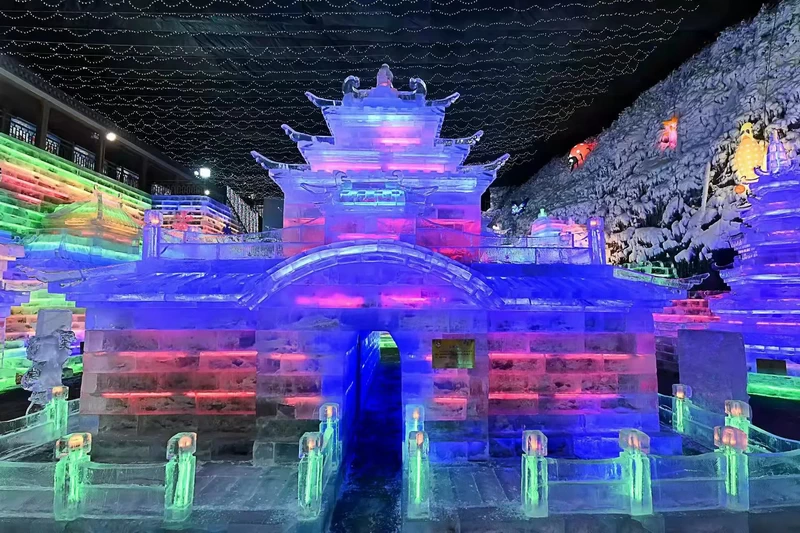
The beautiful ice lanterns and sculptures, set against the backdrop of snowy mountains, create a magical atmosphere. These festivals offer a unique way to experience Beijing’s winter charm, blending art, nature, and traditional festivities in a stunning, frosty landscape.
5. Shichahai Ice Skating Rink in January in Beijing
A must-visit in January is the Shichahai Ice Skating Rink, located in the scenic Shichahai Area ( Qianhai and Houhai). Open from January 5th to February 10th (weather permitting), this rink offers a magical winter experience. Operating from 9:00 AM to 8:30 PM, it’s an affordable and enjoyable way to embrace Beijing’s winter.
Check out Ice Skating in Beijing Winter Travel for more information on the Ice Skating Rinks in Beijing.
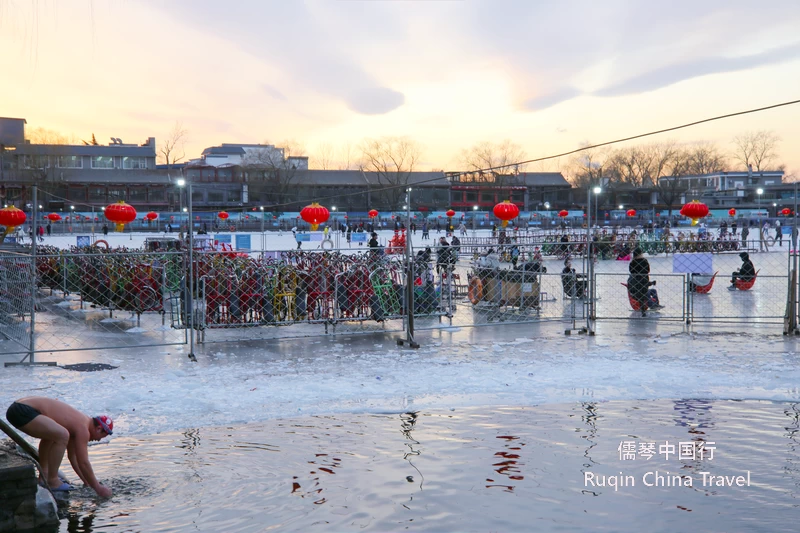
When visiting, dress warmly and consider renting skates if you don’t have your own. This rink is perfect for both beginners and seasoned skaters, offering a fun and supportive environment. Additionally, the picturesque setting of Houhai Lake in winter makes for beautiful photo opportunities.
6. Ski Resorts in Beijing
For those seeking adventure, Beijing’s ski resorts are a great option. These resorts cater to all skill levels, offering various snow activities beyond skiing, such as snowboarding and tobogganing. Popular choices include Nanshan Ski Village, Huaibei International Ski Resort, and Yuyang Ski Resort.
For more information on ski resorts in Beijing, check out Best Ski Resorts in Beijing for more information.
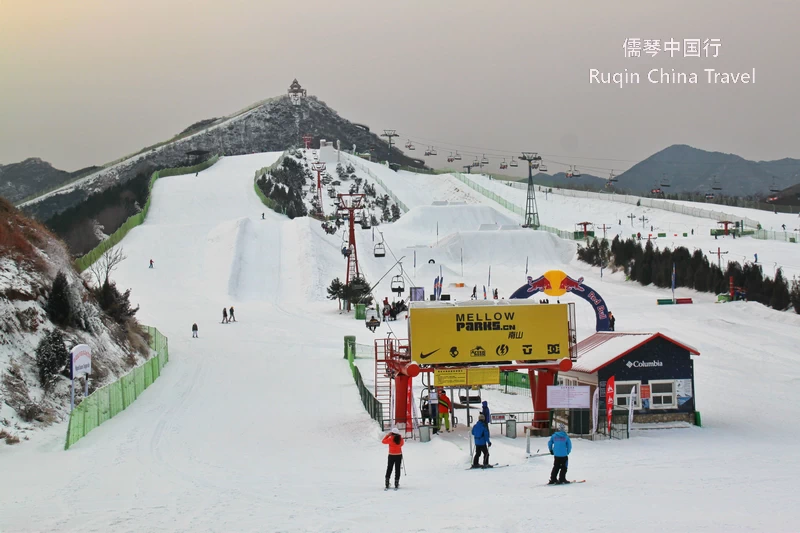
Even if you’re not into skiing, the resorts provide a cozy retreat with cafes where you can relax and enjoy the snowy scenery. It’s advisable to book in advance, especially during peak times, and take advantage of the rental facilities available at the resorts.
7. Best Sections of the Great Wall to Visit in Winter
There are several sections of the Great Wall that are accessible from Beijing. Each offers a unique experience, especially in winter. Check out: Great Wall of China in winter from Beijing
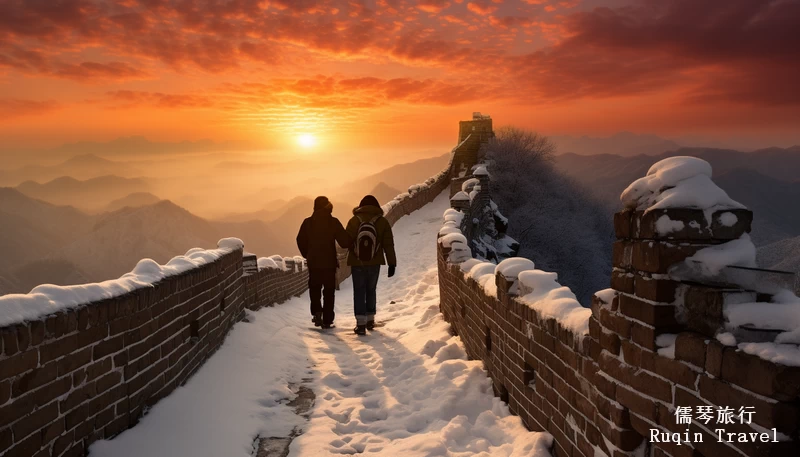
Mutianyu Great Wall
Mutianyu is one of the best-preserved sections of the Great Wall. It is also less crowded than the popular Badaling section. In winter, the snow-covered Wall at Mutianyu is a sight to behold.
The cable car and chair lift make it easier to access, and the toboggan ride down is an exhilarating experience. Check Out: How to Get to Mutianyu Great Wall
Badaling Great Wall
Badaling is the most famous and visited section of the Great Wall. While it can be crowded during peak seasons, winter sees fewer visitors. How to Get to Badaling Great Wall
The Wall at Badaling is well-restored and offers stunning views. The Great Wall Museum and the circular screen cinema provide additional attractions.
Jinshanling Great Wall
For a more rugged and authentic experience, Jinshanling is an excellent choice. This section is partially restored, giving you a glimpse of the Wall’s original condition. How to Get to Jinshanling Great Wall
The snow-covered towers and battlements create a dramatic scene. However, this section requires more physical effort to explore, so be prepared for a challenging hike.
8. Food and Dining in January in Beijing
In January, Beijing’s food scene embraces hearty, warming dishes to combat the cold weather. Hotpot is especially popular during this time. People gather around a bubbling pot of broth, cooking fresh ingredients like meats, vegetables, and tofu. The communal nature of hotpot makes it a fun and cozy dining experience, perfect for winter.
Check out: Beijing Street Food for more food information in Beijing.
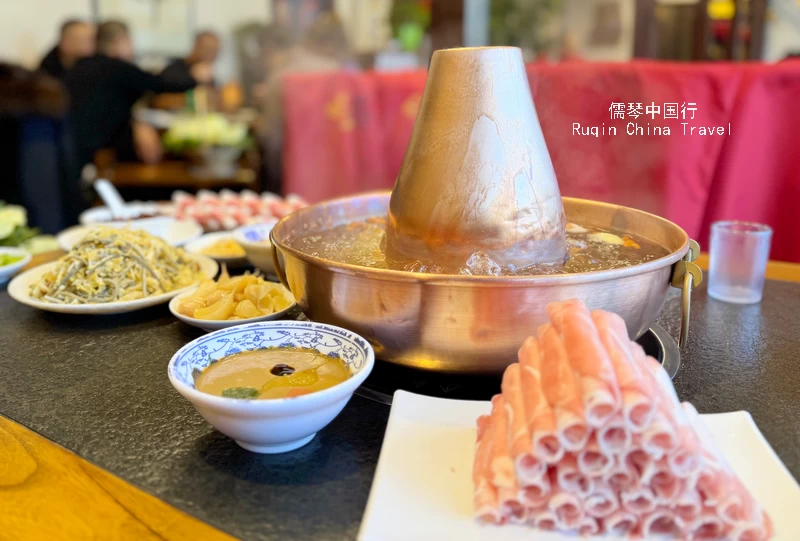
Street vendors also adapt to the chilly season. As you walk through the streets, you’ll find warm treats like roasted chestnuts and sweet potatoes. These snacks are perfect for a winter stroll, offering a comforting, smoky flavor. You’ll also find sugar-coated hawthorn sticks, a popular winter snack that balances sweet and sour flavors.
For a fuller meal, try Beijing’s famous roast duck, often served with crispy skin and tender meat. It’s a must-try dish, especially during the colder months when you need something rich and filling. These winter foods will warm both your body and soul.
Visit Beijing in January allows you to experience the city in a different light. The combination of its rich history, cultural events, and winter activities creates a memorable experience. Whether you’re exploring ancient landmarks or enjoying local cuisine, Beijing in winter has a unique charm that’s worth discovering.
More Beijing Travel Guides
Planning your Beijing tour? Our “Beijing Travel Guide“ section offers essential advice to help you navigate the city like a pro. From transportation tips and local customs to insider recommendations for hidden gems, these travel tips will ensure you have a smooth, enjoyable, and unforgettable experience in China’s vibrant capital. Let us guide you through the best practices for exploring Beijing with confidence!

